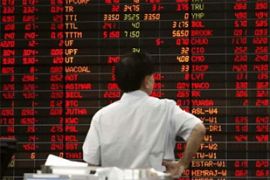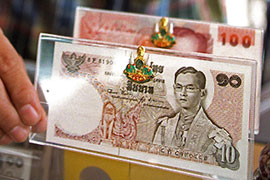Asia jitters as Thai stocks plunge
Thai bank controls spook foreign investors causing biggest share drop since 1997.

At one point stock exchange officials called a brief halt to trading in an effort to stem the slide, the first time trading has been suspended on the exchange.
|
“Please call an ambulance, there is a bloodbath” Thai stockbroker |
Hardest hit were banking, energy and telecommunications stocks. One broker, speaking to Reuters, described the sell-off as a “bloodbath”.
The Stock Exchange of Thailand’s benchmark SET Index eventually closed down 14.8 per cent – sending ripplies across the region.
Markets in Indonesia, Malaysia, Hong Kong and India were all hit by heavy selling as nervous investors cashed in on profits fearing a repeat of the 1997 slump.
In Jakarta shares fell almost 3 per cent, the Mumbai Sensex dropped 2.5 per cent, Malaysian shares end the day down 2 per cent and in Hong Kong the blue chip Hang Seng index closed down 1.2 per cent.
Call for review
 |
| The new controls were brought in to stem a surge in the value of the baht [AFP] |
The Thai central bank introduced the new currency controls on Monday to clamp down on what it said was speculative inflows of foreign capital.
Before the close of trade, with about $20bn wiped off the value of the market, the head of the Thai stock exchange, called on the central bank to review its policies.
But the head of the bank said it was too soon for any changes.
Tarisa Watanagase said she expected the drop in the market would be cushioned by bargain-hunting, partly from foreign funds because those already in Thailand were not subjected to new measures if shifted from one asset to another.
Penalties
Under the new controls, investors bringing new capital into Thailand will have to keep their money in the country for at least a year or face stiff financial penalties.
Effectively the rules mean that if a foreign investor allocated the equivalent of 100 million baht to the Thai bond market, the investor could only buy 70 million baht of bonds, while the remainder would be withheld by the central bank, earning no interest.
If the investor wanted to withdraw the money in less than a year, only two-thirds of the amount withheld would be returned.
The central bank said it had acted because speculative short-term money inflows had jumped to around $950m in the first week of December from about $300m a week in November.
Thailand’s stock market is the third largest in South-East Asia.